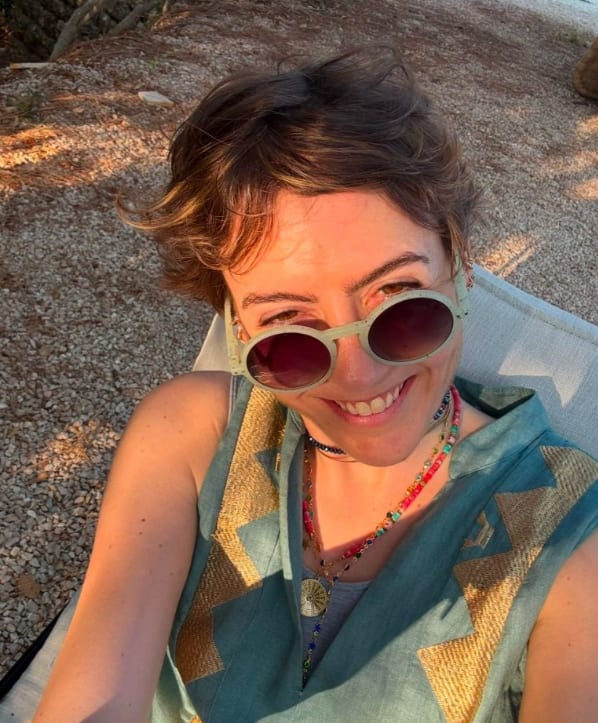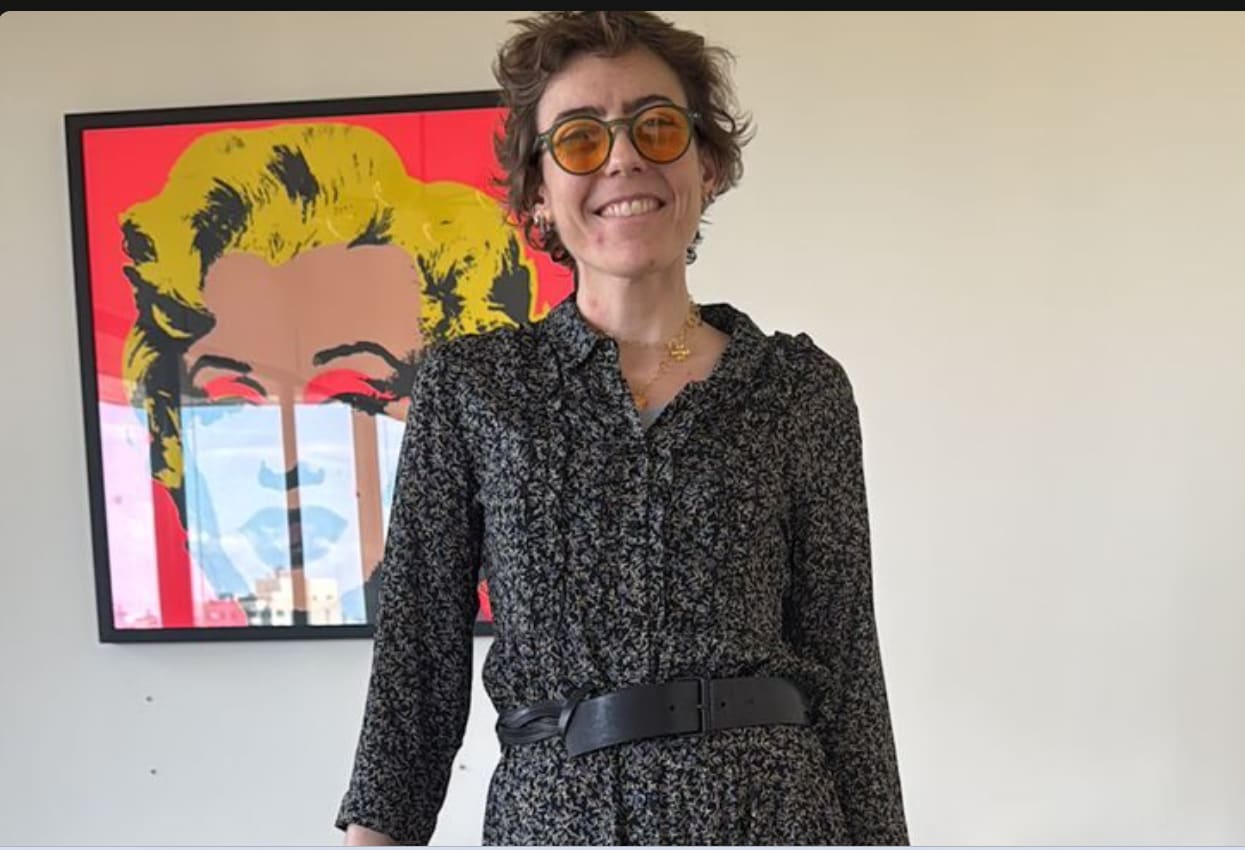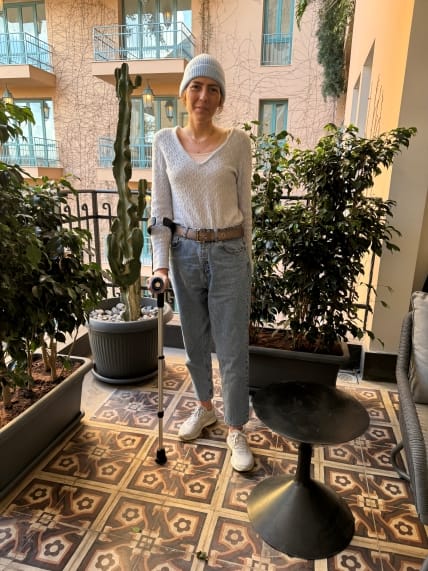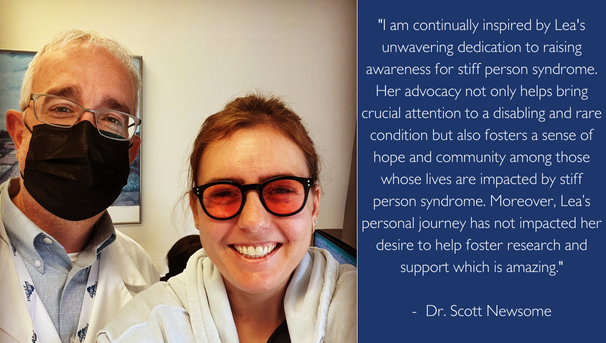Lea speaks to CanvasRebel
Lea shares her story with CanvasRebel. Read the full article here: https://canvasrebel.com/meet-lea-jabre/
In Lea's Own Words - 'Life Wants Me Here'
Lea turns the tide on rare disease, in her article Life Wants Me Here, featured in Rare Revolution Magazine.
To read the whole article, visit: https://rarerevolutionmagazine.com/life-wants-me-here/
Lea on the Ricardo Karem Podcast
Lea recounts her journey with SPS on Ricardo Karem podcast episode titled: Lea Jabre: Between Pain and Hope
'Advocacy Icon' - Arabian Post Highlights Lea's Journey
Lea talks about her passion for storytelling with the Arabian Post.
To read the full article visit, https://thearabianpost.com/from-publishing-house-intern-to-advocacy-icon-lea-fayads-rise-through-words/

'From Crisis to Calling' - Lea is Featured in Gulf Magazine
Lea shares her story about rebuilding her career with Gulf Magazine.
To read the full article visit: https://gulfmagazine.co/work-helped-lea-fayad-rebuild-her/

Lea shares her story with Rare Revolution
Lea details the complexities of chronic pain and the need for more research in SPS, in the October issue of Rare Revolution.
To read the full article, visit: https://rarerevolutionmagazine.com/what-is-pain/
The Pain Series
Lea shares a window into her SPS journey in the second installment of "The Pain Series."
Global SPS Panel Discussion: Part 2
Hear more from five courageous people living with SPS in Part 2 of the panel discussion.
Global SPS Panel Discussion: Part 1
Five people living with SPS from across the globe share their experiences with the disease, along with their perspectives on disease advocacy.
Lea's Interview with Al Jadeed (May 2024)
Lea sat with Al Jadeed's Mariette Younes in May 2024.
Lea's Interview with 20 Minutes France (2023)
Lea was invited to speak with 20 Minutes France. Here is her interview.
Follow Lea's Journey
Lea Jabre is an ambitious Franco-Lebanese, having lived extensively in France, Spain, the United Kingdom, Lebanon and The Gambia. She holds an MSc in International Public Policy from University College of London (UCL), and has professional experience spanning many cultures and languages, as well as across the NGO, advertising, journalism and corporate sectors.
The life and soul of the party, Lea was always “in the center of the dance floor,” despite managing several health conditions, including type 1 diabetes and endometriosis. Her future looked bright. Then in 2017, as she entered her thirties, new health problems surfaced.
In 2021, Lea finally received a confirmed diagnosis of stiff person syndrome (SPS), and in 2022, she met Johns Hopkins neurologist Dr. Scott Newsome, who leads the Stiff Person Syndrome Center there, and to whom she is eternally grateful.
Since then, Lea has become an incredible advocate for SPS, sharing her experiences through social media and interviews. When asked why she decided to lend her voice to this effort, Lea said "I'm doing this for me. I'm doing this for those who follow me. I'm doing this to provide Dr. Newsome and Johns Hopkins the tools to develop targeted treatments for SPS and give people hope for the future, because SPS patients deserve not to be robbed of bright futures or the freedom of freely moving their bodies."
Lea shares her story with Rare Revolution magazine!
In February 2024, Lea developed septic shock and was in intensive care for 16 days. This traumatic experience has reminded her of her physical limitations but also reinforced her cast-iron determination to advocate for people living with rare disease.
She shares more about her experience at https://rarerevolutionmagazine.com/if-youre-not-dancing-something-is-wrong/.

The Johns Hopkins Stiff Person Syndrome Center
The Johns Hopkins Stiff Person Syndrome Center was founded in 2017 in order to help expedite accurate diagnoses and provide clinical care to people living with, and deepen our understanding of, stiff person syndrome (SPS). Johns Hopkins neurologists, however, have been at the forefront of the field for more than a decade and in many ways, the formal designation as a center simply created an infrastructure to expand upon and support the inter- and intradisciplinary research and clinical collaboration that has been taking place for years. In fact, more people living with SPS are seen at Johns Hopkins than anywhere else in the world which sets the foundation for advancing our understanding of this rare disease and helps lead the way towards identifying and developing more effective treatments.
Click through the link above to visit the Center's wesbite!
Scott Newsome, Director of the Johns Hopkins Stiff Person Syndrome Center
Scott Newsome, D.O., M.S.C.S., F.A.A.N., F.A.N.A. specializes in the care of patients with neuroimmunological and neuroinflammatory disorders of the central nervous system. He has a special interest in evaluating and treating patients with stiff person syndrome, multiple sclerosis, and other related disorders. Dr. Newsome works within the Division of Neuroimmunology and Neurological Infections at Johns Hopkins Hospital. He completed his neuroimmunology fellowship at Johns Hopkins and joined the Johns Hopkins faculty after his fellowship.
Dr. Newsome spearheaded building a clinical research program that resulted in the inception of the first and only Stiff Person Syndrome Center in the world for which he directs. He also directs the Neurosciences Consultation and Infusion Center along with the Johns Hopkins Neuroimmunology and Neurological Infectious Disease Fellowship Program and is Co-Director of the Multiple Sclerosis Experimental Therapeutics Program.
Dr. Newsome’s main research focuses on helping identify and test novel therapies and therapeutic strategies in neuroimmunological disorders. In addition, he is helping identify risk factors of disease onset and severity, response to treatment and long-term outcomes in neuroimmunological disorders and specifically stiff person syndrome.
Dr. Newsome has also led efforts to create an international stiff person syndrome consortium in order to help bring researchers and clinicians together for collaborations in hopes to expedite research, and has helped identify the expanding clinical spectrum of stiff person syndrome.
A member of the Miller-Coulson Academy of Clinical Excellence, Dr. Newsome has also served as president of the Consortium of Multiple Sclerosis Centers.
About SPS
Stiff person syndrome spectrum disorders (SPSD) are a group of very painful and debilitating neuroimmunological disorders that are most commonly characterized by muscle stiffness, rigidity, and trigger-induced muscle spasms. Symptoms typically manifest in middle age and are insidious in developing. The subtle initial symptom presentations, in combination of the rarity of the disease, often results in delayed diagnosis and misdiagnosis . Training the next generation of clinicians to recognize signs and symptoms of SPS along with promoting awareness of this disease globally is critical for making earlier diagnoses and minimizing misdiagnoses which are core missions of our center. A variety of commonly encountered stimuli provoke spasms and falls in SPS including sudden movement, cold temperatures and unexpected loud noises (i.e… a car horn). At onset, the spasms and rigidity may be sporadic, but as the disease progresses symptoms become more persistent, leading to loss of independence and severe disability.
Scientists don’t yet completely understand the cause of SPS, but we do know that the immune system is heavily involved. The majority of SPS patients presenting with the classic presentation have antibodies to a very important enzyme, glutamic acid decarboxylase-65 (GAD65). The anti-GAD65 autoimmune responses are thought to interfere with the production of an extremely important primary inhibitory neurotransmitter within the nervous system, gamma-aminobutyric acid (GABA). GABA is critical for helping regulate neuronal excitability and muscle tone throughout the body and in SPS, GABA production is thought to be decreased by the presence of anti-GAD65 antibodies and other immune related factors which in turn contribute to the painful muscle stiffness, spasms, and rigidity, along with other symptoms.
Despite the well-established role of the immune system in the pathophysiology of SPS, the first line therapy for SPS typically involves symptomatic muscle relaxants, such as benzodiazepines, to manage symptoms and help improve patients’ quality of life. The majority of patients are resistant to or inadequately respond to symptomatic therapies which leads to escalating to therapies that target the immune system in a broad and non-specific way. These therapies are not without substantial risks, including septic shock, and other infections including aseptic meningitis. Therefore, immunotherapies specific for patients with SPS represent a major unmet medical need.



